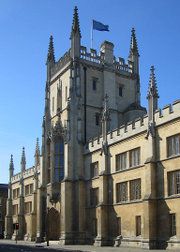Cambridge University Press
Cambridge University Press (known colloquially as CUP) is a publisher given a Royal Charter by Henry VIII in 1534, and one of the two privileged presses (the other being Oxford University Press). It published its first book in 1584, and has published at least one book every year since then, making it the oldest publishing and printing house in the world. It is both an academic and educational publishing house, a printing factory, and the printer for official documents for the University of Cambridge. Authors published by Cambridge have included John Milton, William Harvey, Isaac Newton, Brian J. Ford and Stephen Hawking. CUP was first exempted from UK Corporation Tax in 1976 For history, see [1].
The Press is now a global organisation with a regional structure operating in the Americas, in UK/Europe/Middle-East/Africa, and in Asia-Pacific. Headquartered in Cambridge UK, the company has warehousing centres in Cambridge, New York, Melbourne, Madrid, Cape Town, São Paulo and Singapore, with offices and agents in many other countries. Its publishing output includes major ELT courses; tertiary textbooks and monographs; scientific and medical reference; professional lists in law, management and engineering; educational coursebooks; and e-learning materials for schools via the Cambridge-Hitachi joint venture. Its publications are aimed at markets worldwide, at all levels from primary school to postgraduate and professional. The Press also publishes Bibles, prayer books, and some 200 academic journals. It has 25,000 authors in 116 countries and issues between 1,500 and 2,000 new titles a year.
Controversy Over Alms for Jihad
In 2007, controversy arose over CUP's decision to destroy all remaining copies of its 2006 book, Alms for Jihad: Charity and Terrorism in the Islamic World, by Burr and Collins, as part of the settlement of a lawsuit brought by Saudi billionaire Khalid bin Mahfouz. The decision did not have the support of the book's authors and was criticised by some who claimed it was incompatible with freedom of speech and with freedom of the press and that it indicated that English libel laws were excessively strict [2][3]. American Congressman, Frank R. Wolf the New York Times Book Review, (7 October 2007) described Cambridge's settlement as "basically a book burning."[4]
CUP pointed out that, at that time, it had already sold most of its copies of the book. It claimed that some of the sources the book cited had been shown to be false and that under English libel laws it would not have had a case in any suit [5].
The American Library Association issued a recommendation to libraries still holding Alms for Jihad: "Given the intense interest in the book, and the desire of readers to learn about the controversy first hand, we recommend that U.S. libraries keep the book available for their users."
References
- David McKitterick, A History of Cambridge University Press, 3 vols (Cambridge: Cambridge University Press, 1992-2004)
